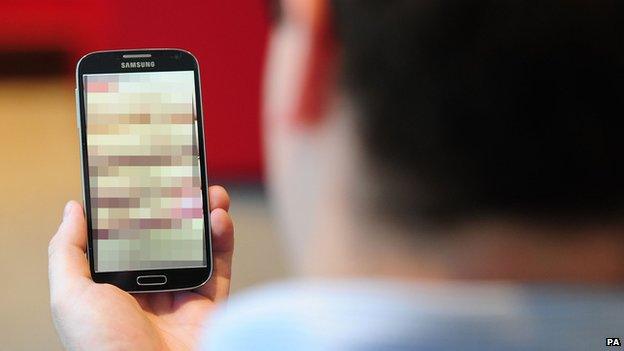'Revenge porn' illegal under new UK law
- Published

The distribution of images and videos can be reported directly to the police
People who post so-called "revenge porn" pictures and videos on the internet could face two years in jail under a new law.
The new Criminal Justice and Courts Bill will have an amendment dealing specifically with the practice.
"We want those who fall victim to this type of disgusting behaviour to know that we are on their side," said Justice Secretary Chris Grayling.
Physical distribution of images will also be covered.
"The fact that there are individuals who are cruelly distributing intimate pictures of their former partners without their consent is almost beyond belief," Mr Grayling said.
He said authorities would do "everything we can to bring offenders to justice".
"That is why we will change the law and make it absolutely clear to those who act in this way that they could face prison."
The amendment will cover images sent on Facebook, Twitter and other social networks. It will also include those sent by text message.
"This type of behaviour can be extremely distressing for its victims causing them significant psychological harm," said Adam Pemberton, assistant chief executive for charity Victim Support.
"We are pleased that people who commit these gross violations of privacy will now face prosecution, and victims of revenge porn know they have the full backing of the law."
'Never acceptable'
Victims of revenge porn have found it difficult to have pictures removed from the internet.
Many sites where the images are hosted are based outside the UK, and requests to remove content are often ignored.
In some cases, asking for removal results in more attention being brought to the images.
According to information from eight police forces in England and Wales which kept data on this issue, there were 149 allegations of revenge porn made in the past two and a half years.

Women's aid charities have described revenge porn as being a form of domestic abuse
The vast majority of victims were women - but only six incidents resulted in police action.
Without specific legislation, some have sought legal workarounds to have images taken down - most commonly the use of copyright law.
If an intimate picture has been taken as a "selfie", the image's copyright belongs to the taker.
The new law seeks to give a stronger option - classing revenge porn as "photographs or films which show people engaged in sexual activity or depicted in a sexual way or with their genitals exposed, where what is shown would not usually be seen in public".
Minister for Women and Equality Nicky Morgan said: "Circulating intimate photos of an individual without their consent is never acceptable. People are entitled to expect a reasonable level of respect and privacy.
"It is right that those who do circulate these images are held to account, and that we educate young people to the hurt that can be caused by breaking this trust."
- Published19 August 2014

- Published2 July 2014

- Published20 April 2012
